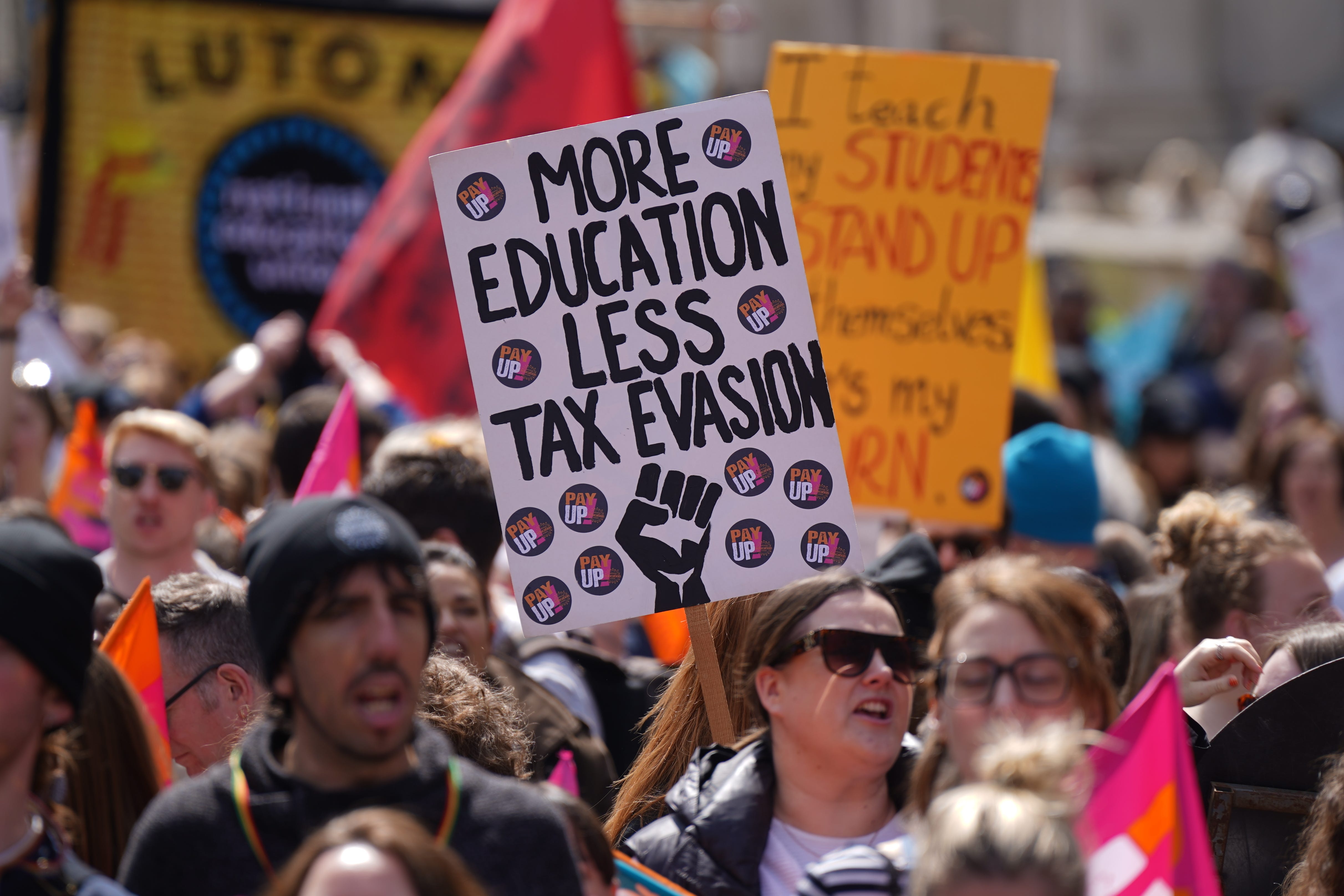Majority of schools in England closed to some pupils during teacher strikes
Pupils and parents faced disruption as National Education Union members walked out in a pay dispute.

Your support helps us to tell the story
From reproductive rights to climate change to Big Tech, The Independent is on the ground when the story is developing. Whether it's investigating the financials of Elon Musk's pro-Trump PAC or producing our latest documentary, 'The A Word', which shines a light on the American women fighting for reproductive rights, we know how important it is to parse out the facts from the messaging.
At such a critical moment in US history, we need reporters on the ground. Your donation allows us to keep sending journalists to speak to both sides of the story.
The Independent is trusted by Americans across the entire political spectrum. And unlike many other quality news outlets, we choose not to lock Americans out of our reporting and analysis with paywalls. We believe quality journalism should be available to everyone, paid for by those who can afford it.
Your support makes all the difference.The majority of schools in England were forced to shut their doors to some pupils as tens of thousands of teachers went on strike, data suggests.
More than half of state schools in England restricted access to pupils or were fully closed during walkouts by teacher members of the National Education Union (NEU), according to Department for Education (DfE) data.
Pupils and parents faced more disruption on Tuesday as teachers returned to picket lines in the latest strike in a long-running pay row.
The DfE said 50% of the 16,400 state schools in England known about were open but restricting attendance on Tuesday and 5% were closed.
On Thursday last week – when NEU teacher members also walked out – 47% of the 16,100 state schools in England known about were open but restricting attendance and 5% were closed.
Picket lines were mounted outside schools on Tuesday and hundreds of striking teachers marched in Westminster before taking part in a rally outside Downing Street.
Outside the DfE, which is overseen by Education Secretary Gillian Keegan, teachers turned their backs to the building and raised their fists as they chanted “Come on Gill, pay the bill”.
The latest DfE data showed London was the most affected region of the country, with 18% of state schools fully open on Tuesday.
Four unions representing teachers and school leaders said they could co-ordinate any future industrial action in England in the autumn after members voted to reject the Government’s pay offer.
For unions to co-ordinate strike action with the aim of causing maximum disruption to schools is unreasonable and disproportionate, especially given the impact the pandemic has already had on students’ learning
The Government offered teachers a £1,000 one-off payment for the current school year (2022/23) and an average 4.5% rise for staff next year after intensive talks with the education unions.
The NEU’s executive is due to meet this month to decide whether to approve three more strike days in late June or early July.
Kevin Courtney, joint general secretary of the NEU, said the strike dates in the summer term are “very likely” to go ahead.
Speaking at a picket line outside City and Islington College in north London, Mr Courtney told the PA news agency: “At that stage that would be just the NEU. All the unions are balloting, we are re-balloting, but the timescales that that will lead to will be the autumn term.
“But we want the Government to settle this before the autumn term, so we want to maintain pressure on the Government before the autumn term.”
Currently only the NEU has a mandate to take strike action and it plans to re-ballot its teacher members in England to take further action in the autumn.
The National Association of Head Teachers (NAHT) and the NASUWT – which both failed to meet the mandatory 50% turnout threshold required for strikes in England in their last ballots – will re-ballot members.
The Association of School and College Leaders (ASCL) is due to hold a formal ballot for national strikes in England for the first time.
Addressing teachers at the rally in central London, Mr Courtney said: “The Government has united the teaching profession as never before and we are going to win.”
The decision on teachers’ pay in England for next year has been passed to the School Teachers’ Review Body (STRB).
A DfE spokesperson said: “For unions to co-ordinate strike action with the aim of causing maximum disruption to schools is unreasonable and disproportionate, especially given the impact the pandemic has already had on students’ learning.
“Children’s education has always been our absolute priority and they should be in classrooms where they belong.
“We have made a fair and reasonable teacher pay offer to the unions, which recognises teachers’ hard work and commitment as well as delivering at additional £2 billion in funding for schools, which they asked for.”